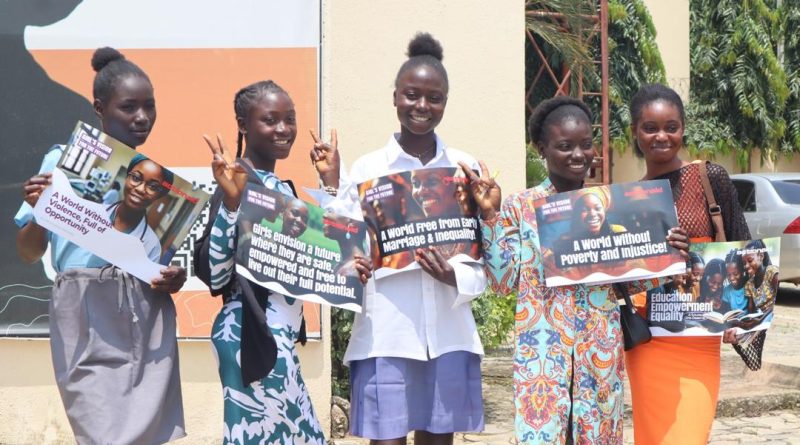ActionAid: Nigerian Societal Norms Seek To Silence Girl Child
By Bukar BOLORI
ActionAid Nigeria has lamented that despite many progress made in gender advocacy in the country, many Nigerian girls remain burdened by issues like early marriage, gender-based violence, lack of access to quality education, and the societal norms that continually attempt to silence their voices.
The Country Director of ActionAid Nigeria, Andrew Mamedu speaking at the commemoration of 2024 International Day of the Girl in Abuja on Friday noted that the theme of the celebration: “Girls’ Vision for the Future,” could not be more fitting as it serves as a powerful reminder that girls are not just passive recipients of change, they are the architects of a better, more equitable tomorrow.
He said: “However, as we celebrate today, we must also acknowledge the harsh realities that too many girls in Nigeria still face. Despite progress, many of our girls remain burdened by issues like early marriage, gender-based violence, lack of access to quality education, and the societal norms that continually attempt to silence their voices.”
He decried that: “In Northern Nigeria, for instance, only 47% of girls attend school in some areas, while issues such as child marriage and teenage pregnancy persist at alarming rates.
“We know that girls are disproportionately affected by crises, often being the first to feel the impact of economic insecurity, violence, and systemic exclusion,” But added that “it is essential to remind ourselves that these girls are not victims in need of rescue,they are and always have been powerful agents of change.”
Mamedu stated that: “From the research carried out in Jigawa and the FCT, 60% of men believes that it is detrimental to educate a girl because it leads to immorality, while others believe that education is important but prefers girls to learn a skill or engage in petty trade and 54.5% of boys felt that educating girls was unnecessary since girls would eventually get married, making it pointless to invest in their education. These and many other findings were captured during the research. This goes a long way to inform you that, girls are not prioritized and that needs to change.”
He said: “At ActionAid Nigeria, we believe in the immense power of girls’ voices, perspectives, and experiences. Through initiatives like our girl-led research in communities across Jigawa and Abuja, we have seen first-hand how girls are confronting the issues that affect them, from menstrual health and hygiene to safety from violence. These girls are not just identifying the problems they are leading the way in developing solutions. They are holding up a mirror to society, exposing its failures, and demanding their rightful place at decision-making tables.
“This International Day of the Girl, we are not just celebrating the challenges that girls have overcome, but we are also celebrating their resilience, their vision, and their determination to create a future that is safe, just, and filled with opportunities. From standing up for their right to education to pushing back against harmful stereotypes, girls are challenging the systems that limit them.
“We see this in the findings from our research. Girls in Nigeria told us that education is key to their future, they want more access to schools, to digital tools, and to environments free from violence and harassment. They want spaces where they can be heard and where their aspirations are recognized.”
He said: “As adults, as leaders, and as allies, we have a duty to not only listen but to act. We must push for policies that prioritize girls’ education, protect them from violence, and ensure they have equal access to resources and opportunities. And we must commit to creating spaces where girls can share their vision, and where we can work alongside them to bring that vision to life.”
One of the girls from the girl led research on issues around girls in the country, Favour Usman said: “Our theme today, “Girls’ Vision for the Future,” speaks not just to a dream but to our reality as young girls who want to be heard, to lead, and to create the changes we need in our communities and our country.
It’s about imagining a future where girls are safe, empowered, and free to reach our full potential.
She said: “Educating girls is non-negotiable: It is essential that the government and other stakeholders provide scholarships, reduce the cost of school materials, and ensure that girls have accessible, affordable and safe school experience. No girl should be forced to drop out because her family cannot afford the fees.
“Support Menstrual Health: No girl should have to go through stress because of her period. Girls should not have to miss school or risk their health because they cannot manage their periods. We need free menstrual health education and sanitary products for girls.
“We must educate our communities about the importance of girls’ education, health, and safety. We believe that community leaders, parents, and girls themselves need more information on these issues to help us drive change.
“End Gender-Based Violence: There must be stronger laws and better enforcement to protect girls from violence. We need safe spaces in our communities where girls can report violence and intimidation without fear, and where we can receive the support, we need to heal and recover.”




